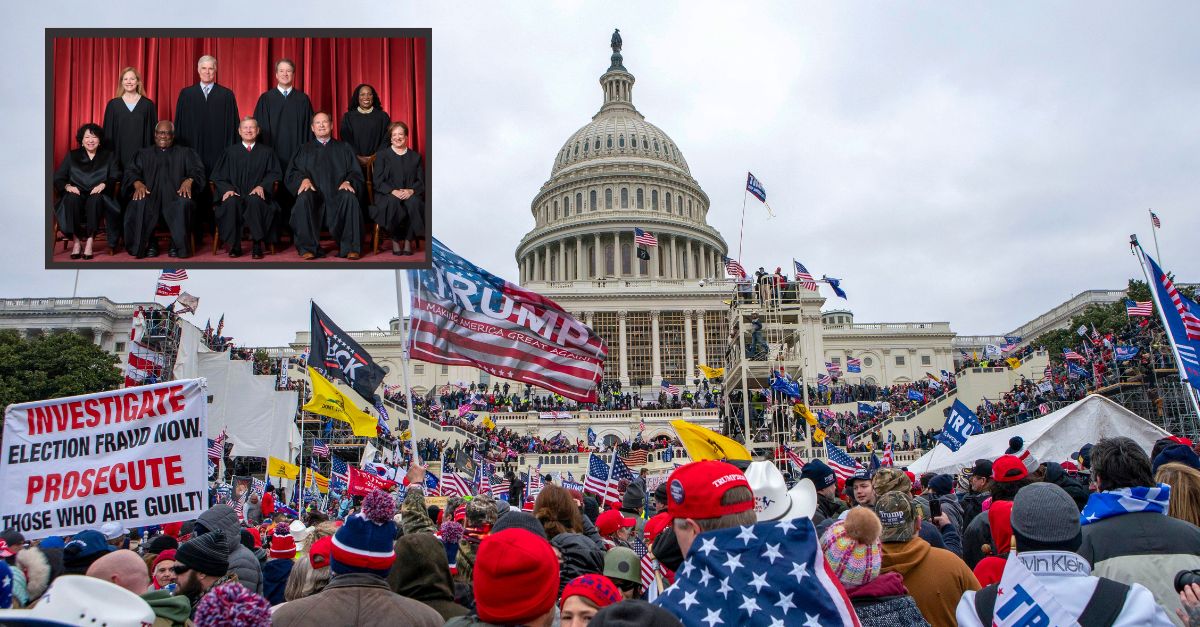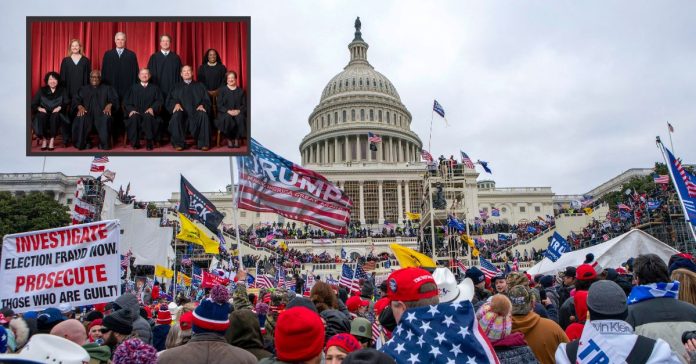
FILE — Rioters loyal to President Donald Trump at the U.S. Capitol in Washington, Jan. 6, 2021 (AP Photo/Jose Luis Magana, File). Inset: The Justices of the U.S. Supreme Court as of June 30, 2022. Front row, left to right: Associate Justice Sonia Sotomayor, Associate Justice Clarence Thomas, Chief Justice John G. Roberts, Jr., Associate Justice Samuel A. Alito, Jr., and Associate Justice Elena Kagan. Back row, left to right: Associate Justice Amy Coney Barrett, Associate Justice Neil M. Gorsuch, Associate Justice Brett M. Kavanaugh, and Associate Justice Ketanji Brown Jackson (photo via Fred Schilling, Collection of the Supreme Court of the United States).
A legal issue that could potentially upend dozens of convictions in the Jan. 6 attack on the U.S. Capitol has landed before the nation’s highest court.
The U.S. Supreme Court agreed Wednesday to hear the case of Joseph Fischer, who was charged with various crimes in connection with the Capitol riot when thousands of Donald Trump supporters descended on the building and violently breached its doors as Congress began to certify President Joe Biden’s win in the 2020 election.
“The motion of petitioner for leave to proceed in forma pauperis and the petition for a writ of certiorari are granted,” the Supreme Court said in the order. Court filings indicate that Fischer is represented by federal public defenders.
According to federal prosecutors, Fischer, then a police officer with the North Cornwall Township Police Department in Pennsylvania, yelled “Charge!” before running toward a line of police officers at the Capitol that day. He is also alleged to have had a “physical encounter with at least one police officer.” He was charged with multiple felonies, as well as trespassing and disorderly conduct.
The most serious of those charges was obstruction of an official proceeding of Congress, a violation of federal statute 18 U.S.C. § 1512(c)(2).
That statute reads, in relevant part, as follows:
(c) Whoever corruptly —
(1) alters, destroys, mutilates, or conceals a record, document, or other object, or attempts to do so, with the intent to impair the object’s integrity or availability for use in an official proceeding; or
(2) otherwise obstructs, influences, or impedes any official proceeding, or attempts to do so,
shall be fined under this title or imprisoned not more than 20 years, or both.
The question the justices will consider, according to the docket, is whether the D.C. Circuit erred in construing the statute, “which prohibits obstruction of congressional inquiries and investigations[,] to include acts unrelated to investigations and evidence?”
Prosecutors have argued that while the enumerated offenses in the first subsection are specifically aimed at actions like destroying evidence, the second subsection, starting with the word “otherwise,” is meant to essentially be a “catchall” to address any other action, “corruptly” taken, to block “any official proceeding.”
Defendants have argued the statute is confined to actions such as destroying potentially incriminating documents, as consulting firm Arthur Anderson was found to have done on behalf of Enron as the then-crumbling energy company was starting to crumble, leading to what was then the largest corporate bankruptcy in the world.
Lawyers for Jan. 6 defendants have repeatedly tried to get the obstruction charge dismissed. For the most part, they have failed — 18 federal district judges in Washington have upheld the obstruction charge in Jan. 6 cases, following in the footsteps of U.S. District Judge Dabney Friedrich, a Trump appointee who was the first to issue a written ruling on the matter.
Only one judge at the trial level found the statute does not apply: U.S. District Judge Carl Nichols, a Trump appointee and the presiding judge in the case of Garret Miller, a defendant in a separate case that was consolidated with Fischer’s for purposes of challenging the obstruction statute.
The Justice Department appealed, and a three-judge panel of the U.S. Circuit Court of Appeals for the District of Columbia heard the case in December 2022. In a fractured ruling in April, the three judges reversed Nichols’ dismissal of the obstruction charge, and Fischer, along with Garret and a third defendant, Edward Lang, appealed to the Supreme Court.
A decision to uphold the dismissal would likely wreak havoc on the government’s yearslong prosecution of the Jan. 6 attack. More than 290 defendants have been charged with felony obstruction under the statute or attempting to do so. Some of the most recognizable names to emerge from the attack — including so-called “QAnon shaman” Jacob Chansley, Scott Fairlamb, and Paul Hodgkins — have pleaded guilty to the offense, while federal juries have convicted high-profile defendants such as Guy Reffitt and Oath Keepers leader Stewart Rhodes, along with four of his co-defendants, on the count.
According to the Justice Department, more than 327 people accused in the Jan. 6 attack have been charged with the federal obstruction defense, which carries a potential 20-year prison sentence, and at least 92 have been convicted of it.
Have a tip we should know? [email protected]

